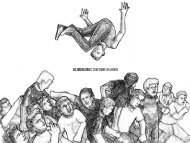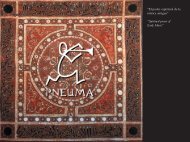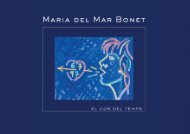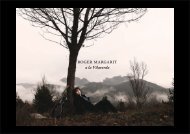blaus de l'ànima maria del mar bonet - The Orchard
blaus de l'ànima maria del mar bonet - The Orchard
blaus de l'ànima maria del mar bonet - The Orchard
Create successful ePaper yourself
Turn your PDF publications into a flip-book with our unique Google optimized e-Paper software.
MANEL<br />
CAMP<br />
MARIA<br />
DEL MAR<br />
BONET<br />
<strong>blaus</strong> <strong>de</strong> l’ànima<br />
Més <strong>de</strong> 20 anys<br />
ben a prop
ÍNDEX<br />
ÍNDICE<br />
SUMMARY<br />
CAT ESP ENG<br />
1 Lover Man 5 13 21<br />
2 No sé tu com ho sents 5 13 21<br />
3 Mercè 5 13 21<br />
4 Si véns prest 5 13 21<br />
5 Mai donis per finit 6 14 22<br />
6 No voldria res més ara 6 14 22<br />
7 Ja n’hi ha prou 6 14 22<br />
8 La barbera 6 14 22<br />
9 Cançó <strong>de</strong> l’amor petit 7 15 23<br />
10 Epigrama 7 15 23<br />
11 Dolça remor <strong>de</strong> cada tarda 7 15 23<br />
12 Què volen aquesta gent? 7 15 23<br />
13 Kursaal 8 16 24<br />
14 Jo em donaria a qui em volgués 8 16 24<br />
15 Cançó <strong>de</strong>l bes sense port 8 16 24<br />
16 Abraça’m 8 16 24<br />
17 Pleniluni 8 16 24<br />
18 Blues en sol 8 16 24<br />
19 La Balanguera 9 17 25<br />
20 Jim 9 17 25<br />
21 L’àguila negra 9 17 25<br />
22 La meva petita terra 9 17 25
BLAUS DE L’ÀNIMA<br />
MARIA DEL MAR BONET<br />
Cantar al costat <strong>de</strong> Manel Camp és gaudir. I és també aprendre<br />
d’un gran artista i d’una persona meravellosa; és comptar amb<br />
la complicitat d’un gran amic.<br />
M’agra<strong>de</strong>n els colors <strong>de</strong> la música d’en Manel… Aquells <strong>blaus</strong><br />
tendres, <strong>blaus</strong> «averdosats» i <strong>mar</strong>ins, tornassolats <strong>de</strong> liles <strong>de</strong>l<br />
<strong>mar</strong> més saliner. Consol per al cor. M’agrada endinsar-me per<br />
les ressonàncies <strong>de</strong>l seu piano, sempre hi <strong>de</strong>scobreixo coses<br />
noves. Al seu costat sóc també una espectadora enlluernada.<br />
Ja fa 23 anys que sovint ens trobem per actuar junts. Però<br />
a mi em sembla que fa poc d’aquell 1988 al Teatre Lliure amb<br />
el primer «Ben a prop»… On ens portarà aquesta celebració?<br />
De moment, cap a les tonalitats ‘blaves <strong>de</strong> l’ànima’, que volem<br />
compartir amb vosaltres.<br />
Cantar amb tu aquestes cançons és un privilegi. Gràcies, Manel!
BLAUS DE L’ÀNIMA<br />
MANEL CAMP<br />
El pas <strong>de</strong>l temps és implacable, només cal consultar la data d’aquell disc<br />
«Ben a prop» per constatar que fa més <strong>de</strong> 20 anys d’aquella aventura. El que<br />
em resulta personalment més gratifi cant és la il·lusió i la satisfacció <strong>de</strong> seguir<br />
interpretant un bon recull <strong>de</strong> cançons <strong>de</strong> manera tan particular, sensible, íntima<br />
i apassionada com ho fem a cada concert. Penso que no hi ha millor manera<br />
<strong>de</strong> fer partícip a un públic d’una realitat tan fantàstica com és la <strong>de</strong> po<strong>de</strong>r fer<br />
música amb persones que entens i aprecies, convertint l’experiència en la millor<br />
carta <strong>de</strong> presentació <strong>de</strong>l treball fet <strong>de</strong>s <strong>de</strong>l cor, amb els sentiments a fl or <strong>de</strong> pell.<br />
Evi<strong>de</strong>ntment, si tot això és possible és per la magnitud d’aquesta artista<br />
excepcional, la Maria <strong>de</strong>l Mar, capaç <strong>de</strong> posar sobre l’escenari i sobre cada<br />
interpretació la més personal i bella <strong>de</strong> les veus, que evi<strong>de</strong>ncia a cada moment<br />
una absoluta comunicació amb el públic, que mica a mica se sent més corprès<br />
per la sensibilitat, l’elegància i l’energia captivadora.<br />
Gràcies Maria <strong>de</strong>l Mar. Gràcies per estar «Ben a prop» <strong>de</strong>s <strong>de</strong> fa tants anys.<br />
Gràcies per aquesta nova oportunitat <strong>de</strong> compartir la màgia <strong>de</strong> fer música.
1 LOVER MAN 2 NO SÉ TU 4<br />
J. DAVIS / R. RAMIREZ / J. SHERMAN<br />
COM HO SENTS<br />
ADAPTACIÓ AL CATALÀ: JOSEP TERO<br />
No sé per què, però tot m’entristeix,<br />
ni sé què fer perquè em fugi aquest pes;<br />
ja ningú no em besa,<br />
ningú no m’espera...<br />
Ai, amor, on ets que no véns?<br />
El llit més fred, si <strong>de</strong> nit no t’hi sent;<br />
per dir-te «amor», donaria el meu cel.<br />
La lluna em convida<br />
a esti<strong>mar</strong> la vida...<br />
Ai, amor, on ets que no véns?<br />
He sentit dir, que esti<strong>mar</strong> és tan bonic...<br />
Tan bonic i tan difícil...<br />
Prec als estels perquè arribis i siguis ben meu,<br />
ben meu, ben meu.<br />
I mentrestant, perquè això sigui cert,<br />
m’invent el so que fa la teva veu<br />
per dir “t’estim”,<br />
o per dir “et <strong>de</strong>sig”...<br />
Ai, amor, on ets que no véns?<br />
LLETRA: MIQUEL ÀNGEL RIERA (POEMES A NAI)<br />
MÚSICA: DAMIÀ TOMÀS<br />
No sé tu com ho sents. A mi, la pena<br />
em fa volar pels ulls estels <strong>de</strong> fosca<br />
i m’ha <strong>de</strong>ixat la sang, a tall d’eclipsi<br />
com si m’entràs la son d’un déu cansat.<br />
No sé tu com ho sents. A mi, no em resta<br />
cap múscul per laxar amb una rialla<br />
un sol recer <strong>de</strong> sang on jugar a barques,<br />
ni un os que encara cregui en horitzons.<br />
Un plor encès, com una gran mordala,<br />
m’ofega els peixos <strong>de</strong>l caló <strong>de</strong>l coll,<br />
i, enllà <strong>de</strong>l crit, el món sols ni és llegenda.<br />
Estic alegre perquè estic tristíssim<br />
patint calfreds que em dónes, que ni els àngels<br />
em sabrien guarir. Tu, Nai, apaga’t:<br />
combregaré crepuscles, <strong>de</strong>jú d’albes.<br />
M’és prou veure un trosset <strong>de</strong> pell plorosa<br />
per quedar-me enrampat tota la vida.<br />
3<br />
MERCÈ<br />
LLETRA I MÚSICA: MARIA DEL MAR BONET<br />
VERSIÓ INSTRUMENTAL: MANEL CAMP<br />
No va ser molt difícil <strong>de</strong>cidir quin seria el primer<br />
tema <strong>de</strong> la selecció, una cançó <strong>de</strong> la Maria <strong>de</strong>l Mar<br />
amb la qual sempre m’he sentit i<strong>de</strong>ntifi cat: «Mercè»,<br />
<strong>de</strong> la que n’he fet una interpretació lliure, i que forma<br />
part <strong>de</strong>l recorregut d’aquest duet. <br />
SI VÉNS<br />
PREST<br />
LLETRA I MÚSICA: MARIA DEL MAR BONET<br />
Si véns prest,<br />
encara trobaràs festa al carrer;<br />
si véns prest,<br />
i un tros <strong>de</strong> sol ataronjat, un sol darrer;<br />
si véns prest,<br />
no em cridis pel meu nom, ja et sentiré;<br />
la porta estarà oberta, el camí franc,<br />
la casa és la darrera, arran <strong>de</strong>l camp.<br />
No em cridis pel meu nom, ja et sentiré;<br />
t’esper amb el capvespre,<br />
dins el carrer.<br />
Si véns tard,<br />
la festa <strong>de</strong>l carrer s’haurà acabat;<br />
si véns tard,<br />
amb la nit per company al teu costat,<br />
si véns tard,<br />
les fl ors restaran closes fi ns al matí;<br />
si véns tard,<br />
quantes paraules que no s’hauran dit;<br />
si véns tard,<br />
pitjor per a mi...<br />
CATALÀ | 5
5<br />
MAI DONIS<br />
PER FINIT<br />
LLETRA: MIQUEL ÀNGEL RIERA - MÚSICA: JOAN BIBILONI<br />
Mai donis per fi nit el temps <strong>de</strong> seduir-me,<br />
allò que obtens <strong>de</strong> mi que no et conformi mai.<br />
Sempre hi ha un més enllà, una fi ta més alta<br />
cap a la qual segur que ens plaurà gravitar.<br />
Tu me fas engrandir les ànsies <strong>de</strong> misteri,<br />
m’agrada, amb tu, sentir-me perdut dins la <strong>mar</strong> gran,<br />
m’atrau anar sens rumb, aquest no tocar en terra,<br />
<strong>de</strong>l qual ara ja en <strong>de</strong>im miquelangelejar.<br />
Defi neix davant meu els signes <strong>de</strong>l teu codi,<br />
<strong>de</strong>sdibuixa’m, confon-me amb tant <strong>de</strong> tuejar,<br />
apropa’t fi ns al punt on et perdi <strong>de</strong> vista<br />
si em veus empal·lidir és perquè en dónes fam.<br />
6<br />
NO VOLDRIA<br />
RES MÉS ARA<br />
LLETRA I MÚSICA: MARIA DEL MAR BONET<br />
No voldria res més ara<br />
que esti<strong>mar</strong>-te<br />
i sentir el teu cos, ben a prop.<br />
No voldria res més ara<br />
que el teu somriure<br />
i ni un alè d’aire entre tu i jo.<br />
No tenc res més ara<br />
que aquesta cambra;<br />
i, només un poc meva,<br />
la llum <strong>de</strong>ls fi nestrons.<br />
Ahir pel carrer vaig perdre<br />
paraules i cançons<br />
i estic aquest matí tan buida...<br />
Un renou <strong>de</strong> mosques<br />
fa somriure els vidres,<br />
i el vent m’omple <strong>de</strong> fulles<br />
un jardí transparent.<br />
Ben lluny, això, <strong>de</strong> tu i <strong>de</strong> mi,<br />
com si fos un núvol falaguer.<br />
No voldria res més ara<br />
que esti<strong>mar</strong>-te<br />
i sentir el teu cos, ben a prop.<br />
No voldria res més ara<br />
que el teu somriure<br />
i el vent s’enduria <strong>de</strong>ls meus llavis<br />
la cançó.<br />
7<br />
JA N’HI<br />
HA PROU<br />
MANEL CAMP<br />
Si alguna cosa <strong>de</strong>fi neix els interludis instrumentals<br />
en un concert <strong>de</strong> duet, és la necessitat <strong>de</strong> <strong>de</strong>fi nir<br />
atmosferes per po<strong>de</strong>r-les transmetre a qui comparteix<br />
l’escenari, així com també al públic. En alguns<br />
moments cal crear intimitat, en altres és necessària<br />
l’energia vibrant. Aquest darrer referent sempre l’he<br />
trobat en «Ja n’hi ha prou». <br />
8<br />
LA BARBERA<br />
LLETRA: MARIA AURÈLIA CAMPMANY<br />
MÚSICA POPULAR<br />
La vaig sentir per primera vegada a La Cova <strong>de</strong>l<br />
Drac, cantada per en Toni Moreno. Li havia ensenyat<br />
Maria Aurèlia Capmany. Sembla que, antigament, les<br />
barberes <strong>de</strong> París tenien molta fama perquè algunes<br />
exercien, a més a més, l’ofi ci més antic <strong>de</strong>l món. <br />
A París hi ha una barbera<br />
més bonica que un dia clar<br />
i com que diuen que és tan bella,<br />
i bé jo, me n’hi vull anar.<br />
Vaig anar-me’n a l’horabaixa<br />
per arribar en sortir el sol;<br />
la barbera era a la fi nestra<br />
i em preguntà “Jove què vol?”<br />
“Jo voldria que em fes la barba<br />
si no fos massa <strong>de</strong>manar.”<br />
“A punt tinc totes les navalles,<br />
el galant jove, pot entrar.”<br />
“Mentre ella em feia la barba<br />
tres cops vaig perdre el color.”<br />
“Potser us faig mal amb la navalla.”<br />
“No, bonica, és el teu amor.”<br />
“El meu amor”, –contestà ella,<br />
“el meu amor és lluny d’aquí;<br />
un gran vaixell se l’emportava,<br />
se l’emportava, <strong>mar</strong> endins.<br />
Els <strong>mar</strong>iners que el vaixell manen<br />
van vestits <strong>de</strong> vellut vermell.<br />
I el capità que els comanda<br />
té el meu amor, per sempre més.”<br />
CATALÀ | 6
9<br />
CANÇÓ DE<br />
L’AMOR PETIT<br />
LLETRA I MÚSICA: JOAN MANUEL SERRAT<br />
Jo tinc un amor petit<br />
i llaminer<br />
com un infant.<br />
Un amor escadusser<br />
que mossega l’esquer<br />
i no s’empassa l’ham.<br />
Jo tinc un amor rumbós,<br />
vermell i sucós<br />
com una magrana.<br />
Jo tinc un amor amic<br />
que mata <strong>de</strong> gust<br />
i que es mor <strong>de</strong> gana.<br />
Ni cec<br />
ni tràgic<br />
ni pactat.<br />
Ni etern<br />
ni màgic<br />
ni llogat.<br />
Rajant-me pels <strong>de</strong>scosits<br />
tinc un amor petit.<br />
Jo tinc un amor petit<br />
nou com el temps<br />
<strong>de</strong> la saó,<br />
que crema com l’encenall,<br />
arriba a cavall<br />
i s’enfi la als balcons.<br />
Jo tinc un amor company<br />
que no duu records<br />
ni <strong>de</strong>ixa penyores.<br />
Jo tinc un amor per tu<br />
que es posa a ballar<br />
quan li donen corda.<br />
10<br />
EPIGRAMA<br />
LLETRA: JOAN SALVAT-PAPASSEIT<br />
MÚSICA: TOTI SOLER<br />
Un perfum <strong>de</strong> colors ha invadit a Margot,<br />
s’ha vestida <strong>de</strong> pressa:<br />
perquè hom no sabés <strong>de</strong> la sina l’olor,<br />
s’ha posada una fl or<br />
damunt la roba fresca.<br />
11<br />
DOLÇA REMOR<br />
DE CADA TARDA<br />
MICK JAGGER / KEITH RICHARDS / ANDREW OLDHAM<br />
ADAPTACIÓ AL CATALÀ: JOSEP TERO<br />
Dolça remor <strong>de</strong> cada tarda,<br />
no t’esvaeixis, amanyaga’m<br />
amb veus i amb rialles<br />
d’infants que canten<br />
al meu carrer on, només ells,<br />
duen tendresa cada vespre<br />
i vells records que fan renéixer<br />
nostàlgia <strong>de</strong>ls braços,<br />
<strong>de</strong> no po<strong>de</strong>r esti<strong>mar</strong>-los...<br />
Atura un poc aquest turment.<br />
Agredolçor <strong>de</strong> cada tarda,<br />
torna un cop més i embriaga’m;<br />
no te’n <strong>de</strong>scuidis, vine,<br />
porta’m el seu somriure,<br />
tot i que sé que no és per a mi.<br />
12 QUÈ VOLEN<br />
AQUESTA GENT?<br />
LLETRA: LLUÍS SERRAHIMA - MÚSICA: MARIA DEL MAR BONET<br />
De matinada han trucat,<br />
són al replà <strong>de</strong> l’escala;<br />
la <strong>mar</strong>e quan surt a obrir<br />
porta la bata posada.<br />
Què volen aquesta gent<br />
que truquen <strong>de</strong> matinada?<br />
“El seu fi ll, que no és aquí?”<br />
“N’és adormit a la cambra.<br />
Què li volen al meu fi ll?”<br />
El fi ll mig es <strong>de</strong>svetllava.<br />
La <strong>mar</strong>e ben poc en sap,<br />
<strong>de</strong> totes les esperances<br />
<strong>de</strong>l seu fi ll estudiant,<br />
que ben compromès n’estava.<br />
Dies fa que parla poc<br />
i cada nit s’agitava.<br />
Li venia un tremolor<br />
tement un truc a trenc d’alba.<br />
Encara no ben <strong>de</strong>spert,<br />
ja sent viva la trucada<br />
i es llença, pel fi nestral,<br />
a l’asfalt d’una volada.<br />
Els que truquen resten muts,<br />
menys un d’ells, potser el que mana,<br />
que s’inclina al fi nestral.<br />
Darrere xiscla la <strong>mar</strong>e.<br />
De matinada han trucat,<br />
la llei una hora assenyala.<br />
Ara l’estudiant és mort,<br />
n’és mort d’un truc a trenc d’alba.<br />
CATALÀ | 7
13<br />
KURSAAL<br />
MANEL CAMP<br />
He volgut fer present a través d’aquest tema,<br />
«Kursaal», com la il·lusió col·lectiva pot aconseguir<br />
fi tes inimaginables. Fa molts anys un nombrós<br />
grup <strong>de</strong> persones varen iniciar un dur camí cap<br />
a la recuperació <strong>de</strong>l teatre més emblemàtic <strong>de</strong> la<br />
ciutat <strong>de</strong> Manresa. Aquesta peça és el meu petit<br />
homenatge a tota aquella gent. <br />
14<br />
JO EM DONARIA<br />
A QUI EM VOLGUÉS<br />
LLETRA: JOSEP PALAU I FABRE<br />
MÚSICA: MARIA DEL MAR BONET<br />
Jo em donaria a qui em volgués,<br />
com si ni jo me n’adonés,<br />
d’aquest donar-me: com si ho fes<br />
un jo <strong>de</strong> mi que m’ignorés.<br />
Jo em donaria a qui es donés<br />
a canvi meu per sempre més:<br />
que res <strong>de</strong> mi no me’n quedés<br />
en el no-meu que jo en rebés.<br />
Jo em donaria per un bes,<br />
per un <strong>de</strong> sol, però que besés<br />
i <strong>de</strong>l besat em <strong>de</strong>sbesés.<br />
Jo em donaria a qui em volgués,<br />
com si ni jo me n’adonés:<br />
com una almoina que se’m fes.<br />
15 CANÇÓ DEL 17PLENILUNI<br />
BES SENSE PORT<br />
MANEL CAMP<br />
LLETRA: MARIA MERCÈ MARÇAL<br />
MÚSICA: AGUSTÍ FERNÁNDEZ<br />
L’aigua roba gessamins al cor <strong>de</strong> la nit morena.<br />
Blanca bugada <strong>de</strong> sal pels alts terrats <strong>de</strong> la pena.<br />
Tu i jo i un bes sense port com una trena negra.<br />
Tu i jo i un bes sense port en vaixell sense ban<strong>de</strong>ra.<br />
El corb, al fons <strong>de</strong> l’avenc, gavines a l’escullera.<br />
Carbó d’amor dins <strong>de</strong>ls ulls com una trena negra.<br />
Carbó d’amor dins <strong>de</strong>ls ulls i els ulls dins <strong>de</strong> la tristesa.<br />
La tristesa dins la <strong>mar</strong>, la <strong>mar</strong> dins la lluna cega.<br />
I la lluna al grat <strong>de</strong>l vent com una trena negra.<br />
16<br />
ABRAÇA’M<br />
(EMBRACEABLE YOU)<br />
G. GERSHWIN - I. GERSHWIN<br />
ADAPTACIÓ AL CATALÀ: JOSEP TERO<br />
Abraça’m, se’m fa tan dolç el teu bes,<br />
abraça’m, més tendre no tenc res més;<br />
et veig un instant,<br />
i omples <strong>de</strong> festa el record;<br />
el teu <strong>de</strong>ix, estrany,<br />
em torba i em pren el cor.<br />
M’agrada tot el que em fas, el que em dius,<br />
però encara m’agra<strong>de</strong>s més si em somrius...<br />
No t’estiguis mai<br />
<strong>de</strong> dir que vols estar amb mi,<br />
tu, amorós i tendre amic.<br />
«Pleniluni» és una altra <strong>de</strong> les meves peces<br />
instrumentals i que ja va for<strong>mar</strong> part <strong>de</strong>l treball<br />
en directe <strong>de</strong>l «Ben a prop». Sentint aquest disc<br />
com una celebració d’aniversari, no hi podia<br />
faltar aquesta aportació personal. <br />
18<br />
BLUES<br />
EN SOL<br />
LLETRA I MÚSICA: GUILLEM D’EFAK<br />
Estic tan sol quan tu no estàs amb mi.<br />
Jo estic tan sol quan tu no estàs amb mi,<br />
que sé ben re<strong>de</strong>cert que me podria morir.<br />
T’estim tant que em sembla tornar boig.<br />
Lo vermell ho veig blau i lo blau ho veig roig.<br />
T’estim, t’estim, t’estim, i no estimes ningú.<br />
Veig que dius t’estim i no estimes ningú.<br />
Conta’m, conta’m menti<strong>de</strong>s, ningú les diu com tu.<br />
Torna, torna, torna’m a anomenar.<br />
Quan tu dius el meu nom, sembla que em tornin a batejar.<br />
Te vaig veure una volta, me vaig enamorar,<br />
me feres una ullada i mai més me podré curar.<br />
Tu tens verí, tu tens verí...<br />
Això és bo per a tothom, però no és bo per a mi.<br />
Tan sols per culpa teva, me bolc en fang i llim.<br />
Per culpa teva, me bolc en fang i llim.<br />
Voldria avorrir-te, la meitat <strong>de</strong>l que t’estim.<br />
CATALÀ | 8
19<br />
LA BALANGUERA<br />
LLETRA: JOAN ALCOVER<br />
MÚSICA: AMADEU VIVES<br />
La balanguera, misteriosa,<br />
com una aranya d’art subtil,<br />
buida que buida sa fi losa,<br />
<strong>de</strong> nostra vida treu el fi l.<br />
Com una parca bé cavil·la,<br />
teixint la tela per <strong>de</strong>mà...<br />
La balanguera fi la, fi la...<br />
La balanguera fi larà.<br />
Girant l’ullada cap enrera,<br />
guaita les ombres <strong>de</strong> l’avior,<br />
i <strong>de</strong> la nova primavera<br />
sap on s’amaga la llavor.<br />
Sap que la soca més s’enfi la<br />
com més endins pot arrelar.<br />
La balanguera fi la, fi la...<br />
La balanguera fi larà.<br />
De tradicions i d’esperances<br />
tix la senyera pel jovent,<br />
com qui fa un vel <strong>de</strong> nuviances<br />
amb cabelleres d’or i argent.<br />
De la infantesa qui s’enfi la,<br />
<strong>de</strong> la vellura qui se’n va...<br />
La balanguera fi la, fi la...<br />
La balanguera fi larà...<br />
20<br />
JIM<br />
N. SHAWN - C. PETRILLO - M. SAMUELS<br />
ADAPTACIÓ AL CATALÀ: QUICO PI DE LA SERRA<br />
Jim no em porta mai les fl ors que prefereixo.<br />
Jim, no riem mai junts, i jo no m’ho mereixo,<br />
no sé per què estic tan boja per Jim.<br />
Jim no em diu mai que sóc el seu <strong>de</strong>sig ar<strong>de</strong>nt,<br />
el foc <strong>de</strong> l’amor amb ell ja no s’encén,<br />
malgrat els anys que fa que sortim.<br />
Si em sento emmalaltir d’amor,<br />
jo faig com si em vengés;<br />
el <strong>de</strong>ixo fugir, però el meu cor<br />
s’esquerda encara més.<br />
Sé que el dia que m’estimi em <strong>de</strong>ixarà,<br />
po<strong>de</strong>u creure’m; sigui avui o bé <strong>de</strong>mà,<br />
sempre duré amb mi alguna cosa <strong>de</strong> Jim.<br />
21<br />
L’ÀGUILA NEGRA<br />
LLETRA I MÚSICA: BARBARA<br />
ADAPTACIÓ AL CATALÀ: DELFÍ ABELLA<br />
Un bon dia, o potser una nit,<br />
prop <strong>de</strong>l <strong>mar</strong> jo m’havia adormit<br />
quan, <strong>de</strong> cop, el cel s’omple <strong>de</strong> llum<br />
i un ocell negre surt sense venir d’enlloc.<br />
Lentament, les ales bategant,<br />
lentament, ell anava girant.<br />
Prop <strong>de</strong> mi, el batec s’acabà<br />
i, com caigut <strong>de</strong>l cel, l’ocell es va aturar.<br />
Els ulls eren <strong>de</strong> color robí<br />
i les plomes <strong>de</strong> color <strong>de</strong> nit.<br />
I al seu front, mil raigs <strong>de</strong> to suau,<br />
l’ocell, rei coronat, portava un diamant blau.<br />
Amb el bec la cara em va tocar,<br />
el seu coll em vaig trobar a la mà.<br />
Fou llavors que jo vaig saber qui,<br />
imatge <strong>de</strong>l passat, volia tornar amb mi.<br />
Bon ocell, porta’m amb tu al país<br />
d’altres temps, sigues el meu amic.<br />
Com abans, en somnis clars d’infant,<br />
Per collir tremolant estels i més estels.<br />
Com abans, en somnis clars d’infant,<br />
com abans, damunt d’un núvol blanc,<br />
com abans, tu i jo el sol encendrem<br />
i a l’illa <strong>de</strong>l record la pluja llençarem...<br />
L’ocell negre tombà els ulls al sol,<br />
cap al cel tot d’una emprengué el vol.<br />
22 MANEL CAMP<br />
LA MEVA<br />
PETITA TERRA<br />
En un treball tan i<strong>de</strong>ntifi catiu com el que ara<br />
presentem, no hi podia faltar la peça que més<br />
em <strong>de</strong>fi neix: «La meva petita terra». <br />
CATALÀ | 9
AZULES DEL ALMA<br />
MARIA DEL MAR BONET<br />
Cantar al lado <strong>de</strong> Manel Camp es disfrutar. Y es también apren<strong>de</strong>r <strong>de</strong> un<br />
gran artista y <strong>de</strong> una persona <strong>mar</strong>avillosa. Es contar con la complicidad<br />
<strong>de</strong> un gran amigo.<br />
Me gustan los colores <strong>de</strong> la música <strong>de</strong> Manel... Aquellos azules tiernos,<br />
azules verdosos y <strong>mar</strong>inos, tornasolados <strong>de</strong> lilas <strong>de</strong>l <strong>mar</strong> más salinero.<br />
Consuelo para el corazón. Me gusta a<strong>de</strong>ntrarme por las resonancias<br />
<strong>de</strong> su piano, don<strong>de</strong> siempre <strong>de</strong>scubro cosas nuevas. A su lado soy también<br />
una espectadora <strong>de</strong>slumbrada.<br />
Hace ya 23 años que nos reunimos para actuar juntos. Pero a mí me<br />
parece que hace muy poco <strong>de</strong> aquel 1988 en el Teatre Lliure con el primer<br />
«Ben a prop»... ¿Dón<strong>de</strong> nos va a llevar esta celebración? De momento hacia<br />
las «tonalida<strong>de</strong>s azules <strong>de</strong>l alma», que queremos compartir con vosotros.<br />
Cantar contigo estas canciones es un privilegio. ¡Gracias, Manel!
AZULES DEL ALMA<br />
MANEL CAMP<br />
El paso <strong>de</strong>l tiempo es implacable; sólo hace falta consultar la fecha <strong>de</strong> aquel disco<br />
«Ben a prop» (Muy cerca) para constatar que hace más <strong>de</strong> 20 años <strong>de</strong> aquella<br />
aventura. Lo que personalmente me resulta más gratifi cante es la ilusión y la<br />
satisfacción <strong>de</strong> seguir interpretando una buena selección <strong>de</strong> canciones <strong>de</strong> una<br />
manera tan particular, sensible, íntima y apasionada como hacemos en cada<br />
concierto. Pienso que no hay mejor manera <strong>de</strong> hacer partícipe a un público <strong>de</strong><br />
una realidad tan fantástica como la <strong>de</strong> po<strong>de</strong>r hacer música con personas a quienes<br />
entien<strong>de</strong>s y aprecias, convirtiendo la experiencia en la mejor carta <strong>de</strong> presentación<br />
<strong>de</strong>l trabajo hecho <strong>de</strong>s<strong>de</strong> el corazón, con los sentimientos a fl or <strong>de</strong> piel.<br />
Evi<strong>de</strong>ntemente, si todo eso es posible es por la magnitud <strong>de</strong> esta artista excepcional,<br />
Maria <strong>de</strong>l Mar Bonet, que es capaç <strong>de</strong> poner sobre el escenario y sobre cada<br />
interpretación la más personal y bella <strong>de</strong> las voces, que evi<strong>de</strong>ncia a cada momento<br />
una absoluta comunicación con el público, el cual se siente más sorprendido por<br />
la sensibilidad, la elegancia y la enegía cuativadora que ella <strong>de</strong>spren<strong>de</strong>.<br />
Gracias, Maria <strong>de</strong> Mar. Gracias por estar «Ben a prop» <strong>de</strong>s <strong>de</strong> hace tantos años.<br />
Gracias por esta nueva oportunidad <strong>de</strong> compartir la magia <strong>de</strong> hacer música.
1 LOVER MAN 2 NO SÉ COMO 4<br />
J. DAVIS / R. RAMIREZ / J. SHERMAN<br />
LO SIENTES TÚ<br />
ADAPTACIÓN AL CATALÁN: JOSEP TERO<br />
No sé por qué pero todo me entristece,<br />
no sé qué hacer para que todo cambie,<br />
nadie me besa<br />
ya nadie me espera<br />
Ay amor, ¿dón<strong>de</strong> estás, por qué no vienes?<br />
El lecho es frío porqué no estás conmigo,<br />
por <strong>de</strong>cirte “amor”, daría el fi rmamento.<br />
La luna me invita<br />
a enamorarme <strong>de</strong> la vida...<br />
Ay amor, ¿dón<strong>de</strong> estás, por qué no vienes?<br />
He oído <strong>de</strong>cir que a<strong>mar</strong> es tan hermoso,<br />
tan hermoso y tan difícil...<br />
Pido a las estrellas que vengas y seas todo mío,<br />
todo mío.<br />
Mientras, esperando que sea cierto,<br />
invento el sonido <strong>de</strong> tu voz<br />
para <strong>de</strong>cir “te quiero”<br />
para <strong>de</strong>cir “te <strong>de</strong>seo”<br />
Ay amor, ¿dón<strong>de</strong> estás, por qué no vienes?<br />
LETRA: MIQUEL ÀNGEL RIERA (POEMES A NAI)<br />
MÚSICA: DAMIÀ TOMÀS<br />
No sé como lo sientes tú. A mí la pena<br />
hace que en mis ojos vuelen estrellas <strong>de</strong> oscuridad<br />
y me ha <strong>de</strong>jado la sangre como un eclipse,<br />
como si me entrara el sueño <strong>de</strong> un dios cansado.<br />
No sé como lo sientes tú. A mí no me queda<br />
ningún músculo para relajar, con una carcajada,<br />
un solo cobijo <strong>de</strong> sangre para jugar con barcas,<br />
ni un hueso que creyera en horizontes.<br />
Un encendido llanto, como una gran pinza,<br />
me ahoga los peces <strong>de</strong> la caleta <strong>de</strong>l cuello,<br />
y, más allá <strong>de</strong>l grito, el mundo no és ni tan solo leyenda.<br />
Estoy alegre porque estoy tristísimo,<br />
sufriendo los escalofríos que me das, que ni los ángeles<br />
sabrían curarme. Tú, Nai, apágate:<br />
comulgaré crepúsculos, ayuno <strong>de</strong> auroras.<br />
Me basta ver un trocito <strong>de</strong> piel llorosa<br />
para electrizarme toda la vida.<br />
3<br />
MERCÈ<br />
LETRA Y MÚSICA: MARIA DEL MAR BONET<br />
VERSIÓN INSTRUMENTAL: MANEL CAMP<br />
No fue muy difícil <strong>de</strong>cidir cual sería el primer tema<br />
<strong>de</strong> la selección, una canción con la cual siempre me<br />
he sentido i<strong>de</strong>ntifi cado: “Mercè” , <strong>de</strong> la cual he hecho<br />
una interpretación libre que forma parte <strong>de</strong>l recorrido<br />
<strong>de</strong> este duo. <br />
SI VIENES<br />
PRONTO<br />
LETRA Y MÚSICA: MARIA DEL MAR BONET<br />
Si vienes pronto,<br />
aún encontrarás fi esta en la calle,<br />
si vienes pronto,<br />
aún un poco <strong>de</strong> sol, el último <strong>de</strong> la tar<strong>de</strong>.<br />
si vienes pronto,<br />
no me llames por mi nombre, ya te oiré;<br />
la puerta estará abierta, libre el camino.<br />
La casa es la última cerca <strong>de</strong>l campo.<br />
No me llames por mi nombre, ya te oiré,<br />
te espero con el atar<strong>de</strong>cer,<br />
en la calle.<br />
Si vienes tar<strong>de</strong>,<br />
la fi esta <strong>de</strong> la calle se habrá acabado;<br />
si vienes tar<strong>de</strong>,<br />
con la noche caminando a tu lado,<br />
si vienes tar<strong>de</strong>,<br />
las fl ores estarán cerradas hasta la mañana;<br />
si vienes tar<strong>de</strong>,<br />
cuántas palabras quedarán sin <strong>de</strong>cir,<br />
si vienes tar<strong>de</strong>,<br />
peor para mí....<br />
ESPAÑOL | 13
5<br />
NUNCA DES<br />
POR ACABADO<br />
LETRA: MIQUEL ÀNGEL RIERA - MÚSICA: JOAN BIBILONI<br />
Nunca <strong>de</strong>s por acabado el tiempo <strong>de</strong> seducirme,<br />
que no te conforme nunca lo que obtienes <strong>de</strong> mí.<br />
Siempre hay un más allá, un hito más alto<br />
hacia el cual es seguro que nos encantará gravitar.<br />
Tú haces crecer mis ansias <strong>de</strong> misterio,<br />
contigo me gusta sentirme perdido <strong>de</strong>ntro <strong>de</strong>l gran <strong>mar</strong>,<br />
me atrae ir sin rumbo, este no tocar <strong>de</strong> pies a tierra<br />
al cual ya le pusimos nombre: miguelangelear.<br />
Defi ne, ante mí, los signos <strong>de</strong> tu código,<br />
<strong>de</strong>sdibújame, confún<strong>de</strong>me con excesos <strong>de</strong> tutear,<br />
acércate hasta el punto en que te pierda <strong>de</strong> vista<br />
si me ves pali<strong>de</strong>cer, es porque me das hambre.<br />
6<br />
SÓLO QUISIERA<br />
AHORA<br />
LETRA Y MÚSICA: MARIA DEL MAR BONET<br />
Sólo quisiera ahora<br />
tenerte para a<strong>mar</strong>te<br />
y sentir tu cuerpo junto al mío.<br />
Sólo quisiera ahora<br />
tu sonrisa<br />
y ni una tenue brisa entre tu y yo.<br />
No tengo otra cosa ahora<br />
que este cuarto;<br />
y tan sólo un poco mía,<br />
la luz <strong>de</strong> sus ventanas.<br />
Ayer perdí en las calles<br />
palabras y canciones<br />
y esta mañana me siento tan vacía...<br />
El vuelo <strong>de</strong> las moscas<br />
hace sonreír los cristales,<br />
y el viento llena <strong>de</strong> hojas<br />
un jardín transparente.<br />
Y, todo, lejos <strong>de</strong> ti y <strong>de</strong> mí,<br />
como una nube ligera.<br />
Sólo quisiera ahora<br />
tenerte para a<strong>mar</strong>te<br />
y sentir tu cuerpo junto al mío.<br />
Sólo quisiera ahora<br />
tu sonrisa<br />
y el viento se llevaría<br />
<strong>de</strong> mis labios la canción.<br />
7<br />
YA BASTA<br />
MANEL CAMP<br />
Si alguna cosa <strong>de</strong>fi ne los interludios instrumentales<br />
en un concierto <strong>de</strong> duo, es la necesidad <strong>de</strong> <strong>de</strong>fi nir las<br />
atmósferas para po<strong>de</strong>rlas transmitir a quien comparte<br />
el escenario, así como también al público. En algunos<br />
momentos hace falta crear intimidad, en otros se hace<br />
necesaria la energía vibrante. Siempre encuentro este<br />
último referente en «Ja n’hi ha prou» (Ya basta). <br />
8<br />
LA BARBERA<br />
LETRA: MARIA AURÈLIA CAMPMANY - MÚSICA POPULAR<br />
La escuché por primera vez en La Cova <strong>de</strong>l Drac,<br />
cantada por Toni Moreno, que la había aprendido <strong>de</strong><br />
Maria Aurèlia Capmany. Parece ser que, antiguamente,<br />
las barberas <strong>de</strong> París tenían mucha fama porque<br />
algunas, a<strong>de</strong>más, ejercían el ofi cio más antiguo <strong>de</strong>l<br />
mundo. <br />
En París hay una barbera<br />
más bella que un día claro<br />
y, como dicen que es tan bella,<br />
pues bien, quiero ir allí.<br />
Salí pronto por la tar<strong>de</strong>,<br />
para llegar al salir el sol;<br />
la barbera estaba en la ventana<br />
y me preguntó: “Joven, ¿que <strong>de</strong>sea?”<br />
“Quisiera que me arrreglara la barba,<br />
si no fuera mucho pedir”.<br />
“Tengo ya preparadas mis navajas,<br />
el galante joven pue<strong>de</strong> entrar”.<br />
Mientras ella me arreglaba la barba,<br />
tres veces empali<strong>de</strong>cí.<br />
“Quizás os hago daño con la navaja”.<br />
“No preciosa. La causa es tu amor”.<br />
“Mi amor” respondió ella,<br />
“mi amor está lejos <strong>de</strong> aquí,<br />
un gran barco se lo llevó,<br />
se lo llevó <strong>mar</strong> a<strong>de</strong>ntro.<br />
Los <strong>mar</strong>ineros que gobiernan el barco<br />
van vestidos <strong>de</strong> terciopelo rojo.<br />
Y el capitán que los manda,<br />
tiene a mi amor para siempre jamás”.<br />
ESPAÑOL | 14
9<br />
CANCIÓN DEL<br />
AMOR PEQUEÑO<br />
LETRA Y MÚSICA: JOAN MANUEL SERRAT<br />
Yo tengo un amor pequeño<br />
y goloso<br />
como un niño.<br />
Un amor huidizo<br />
que muer<strong>de</strong> el cebo<br />
y no traga el anzuelo.<br />
Yo tengo un amor rumboso,<br />
encarnado y jugoso<br />
como una granada.<br />
Yo tengo un amor amigo<br />
que mata <strong>de</strong> gusto<br />
y muere <strong>de</strong> hambre.<br />
Ni ciego<br />
ni trágico<br />
ni pactado.<br />
Ni eterno<br />
ni mágico<br />
ni alquilado.<br />
Desbordándome hasta el cuello,<br />
yo tengo un amor pequeño.<br />
Yo tengo un amor pequeño,<br />
nuevo, como el tiempo<br />
<strong>de</strong> la sazón,<br />
que ar<strong>de</strong> como una viruta,<br />
llega a caballo<br />
y trepa a los balcones.<br />
Yo tengo un amor compañero<br />
que no trae recuerdos,<br />
que no <strong>de</strong>ja prendas.<br />
Yo tengo un amor por ti<br />
que arranca a bailar<br />
cuando le dan cuerda.<br />
10<br />
EPIGRAMA<br />
LETRA: JOAN SALVAT-PAPASSEIT<br />
MÚSICA: TOTI SOLER<br />
Un perfume <strong>de</strong> colores ha llenado a Margot<br />
Que se vestía <strong>de</strong>prisa:<br />
Para que no se notara el aroma <strong>de</strong> su pecho<br />
ha colocado una fl or<br />
sobre su ropa fresca.<br />
11DULCE<br />
MURMULLO<br />
DE CADA TARDE<br />
MICK JAGGER / KEITH RICHARDS / ANDREW OLDHAM<br />
ADAPTACIÓN AL CATALÁN: JOSEP TERO<br />
Dulce murmullo <strong>de</strong> cada tar<strong>de</strong>,<br />
no <strong>de</strong>saparezcas, envuélveme<br />
con las voces y las risas<br />
<strong>de</strong> los niños que cantan<br />
en mi calle, don<strong>de</strong> sólo ellos,<br />
la llenan <strong>de</strong> ternura cada atar<strong>de</strong>cer,<br />
la llenan <strong>de</strong> viejos recuerdos.<br />
Los brazos sienten nostalgia<br />
por no po<strong>de</strong>r abrazarlos.<br />
Detén este tormento.<br />
Agridulzor <strong>de</strong> cada tar<strong>de</strong>,<br />
vuelve una vez más, embriágame,<br />
no te olvi<strong>de</strong>s, ven,<br />
tráeme sus sonrisas<br />
aunque ya sé que no son para mí.<br />
12 QUÉ ES LO QUE<br />
QUIERE ESTA GENTE?<br />
LETRA: LLUÍS SERRAHIMA - MÚSICA: MARIA DEL MAR BONET<br />
De madrugada han llamado,<br />
en la escalera esperaban;<br />
cuando sale a abrir la madre<br />
llevaba puesta la bata.<br />
“¿Qué es lo que quiere esta gente<br />
que viene <strong>de</strong> madrugada?”<br />
“Su hijo, ¿se encuentra aquí?”<br />
“Está durmiendo en su cama.<br />
¿Qué <strong>de</strong>sean <strong>de</strong> mi hijo?”<br />
El hijo se espavilaba.<br />
La madre bien poco sabe,<br />
<strong>de</strong> todas las esperanzas<br />
<strong>de</strong> su hijo el estudiante,<br />
que tan comprometido estaba.<br />
Hace días que habla poco<br />
cada noche se agitaba.<br />
Y un temblor lo recorría<br />
temiendo aquella llamada.<br />
Aún sin <strong>de</strong>spertar <strong>de</strong>l todo<br />
se oye clara la llamada,<br />
y hasta la calle <strong>de</strong> un salto,<br />
se tira por la ventana.<br />
Los que llaman enmu<strong>de</strong>cen,<br />
menos, tal vez, el que manda,<br />
que se asoma al ventanal.<br />
Mientras, la madre gritaba.<br />
De madrugada han llamado,<br />
la ley su hora señala.<br />
El estudiante está muerto,<br />
<strong>de</strong> una llamada en el alba.<br />
ESPAÑOL | 15
13<br />
KURSAAL<br />
MANEL CAMP<br />
He querido hacer presente a través <strong>de</strong>l tema «Kursaal»<br />
cómo la ilusión colectiva pue<strong>de</strong> conseguir hitos<br />
inimaginables. Hace muchos años un numeroso<br />
grupo <strong>de</strong> personas inció un duro camino hacia la<br />
recuperación <strong>de</strong>l teatro más emblemático <strong>de</strong> la ciudad<br />
<strong>de</strong> Manresa. Esta pieza es mi pequeño homenaje<br />
a toda aquella gente. <br />
14 YO ME DARÍA<br />
A QUIEN ME QUISIERA<br />
LETRA: JOSEP PALAU I FABRE - MÚSICA: MARIA DEL MAR BONET<br />
Yo me daría a quien me quisiera,<br />
como si ni cuenta me diera,<br />
<strong>de</strong> mi entregarme: como si lo hiciera<br />
un yo <strong>de</strong> mí que me ignorase.<br />
Yo me daría a quien se diera<br />
a cambio mío para siempre:<br />
que nada mío me quedara<br />
en el no-mío que yo recibiera.<br />
Yo me daría por un beso,<br />
por uno sólo pero que besase<br />
y <strong>de</strong> lo besado me <strong>de</strong>sbesara.<br />
Yo me daría a quien me quisiera,<br />
como si ni cuenta me diera,<br />
como una limosna que se me hiciera.<br />
15 CANCIÓN DEL 17PLENILUNIO<br />
BESO SIN PUERTO<br />
MANEL CAMP<br />
LETRA: MARIA MERCÈ MARÇAL - MÚSICA: AGUSTÍ FERNÁNDEZ<br />
El agua roba jazmines al corazón <strong>de</strong> la noche morena.<br />
Blanca colada <strong>de</strong> sal por las altas terrazas <strong>de</strong> la pena.<br />
Tu y yo y un beso sin puerto como una trenza negra.<br />
Tu y yo y un beso sin puerto en un barco sin ban<strong>de</strong>ra.<br />
El cuervo en el fondo <strong>de</strong>l abismo, gaviotas en el rompeolas.<br />
Carbón <strong>de</strong> amor en los ojos como una trenza negra.<br />
Carbón <strong>de</strong> amor en los ojos y los ojos en la tristeza.<br />
La tristeza en el <strong>mar</strong>, el <strong>mar</strong> en la luna ciega.<br />
Y la luna a merced <strong>de</strong>l viento como una trenza negra.<br />
16<br />
ABRÁZAME<br />
(EMBRACEABLE YOU)<br />
G. GERSHWIN - I. GERSHWIN<br />
ADAPTACIÓN AL CATALÁN: JOSEP TERO<br />
Abrázame, son tan dulces tus besos,<br />
abrázame, no tengo nada más tierno que tus besos;<br />
te veo un instante<br />
y llenas <strong>de</strong> fi esta todos mis recuerdos;<br />
tu manera <strong>de</strong> ser, extraña,<br />
me turba y se me lleva el corazón.<br />
Me gustan tanto tus caricias, tus palabras,<br />
pero todavía me gustas más si sonríes...<br />
No <strong>de</strong>jes nunca<br />
<strong>de</strong> <strong>de</strong>cirme que quieres estar conmigo,<br />
tú, mi querido, mi tierno amigo.<br />
«Pleniluni» es otra <strong>de</strong> mis piezas instrumentales,<br />
que ya formó parte <strong>de</strong>l trabajo en directo <strong>de</strong> «Ben<br />
a prop». Sintiendo este disco como una celebración<br />
<strong>de</strong> aniversario, no podia faltar en él esta aportación<br />
personal. <br />
18<br />
BLUES<br />
EN SOL<br />
LETRA Y MÚSICA: GUILLEM D’EFAK<br />
Me encuentro tan solo cuando no estás conmigo.<br />
Me encuentro tan solo cuando no estás conmigo,<br />
que estoy convencido <strong>de</strong> que podría morir.<br />
Te amo tanto que creo volverme loco.<br />
Veo rojo lo que es azul y azul lo que es rojo.<br />
Te amo, te amo, te amo y tú no amas a nadie.<br />
Te oigo <strong>de</strong>cir te amo, y tú no amas a nadie.<br />
Miénteme, nadie lo hace como tú.<br />
Vuelve, vuelve, vuelve a <strong>de</strong>cir mi nombre.<br />
Cuando lo dices, siento que me vuelven a bautizar.<br />
Te vi solo una vez y me enamoré,<br />
me lanzaste una mirada <strong>de</strong> la que nunca sanaré.<br />
Envenenas, envenenas...<br />
Será bueno en general, pero no para mí.<br />
Me revuelco en fango y limo sólo por tu culpa.<br />
Por tu culpa me revuelco en limo y fango.<br />
Quisiera aborrecerte, la mitad <strong>de</strong> lo que te amo.<br />
ESPAÑOL | 16
19<br />
LA BALANGUERA<br />
LETRA: JOAN ALCOVER<br />
MÚSICA: AMADEU VIVES<br />
La balanguera, misteriosa<br />
como una araña <strong>de</strong> arte sutil,<br />
vacía que vacía su rueca<br />
<strong>de</strong> nuestra vida saca el hilo.<br />
Como una parca bien cavila,<br />
tejiendo la tela para mañana…<br />
La balanguera hila, hila…<br />
La balanguera hilará.<br />
Girando la mirada hacia atrás,<br />
vigila las sombras <strong>de</strong> antepasados<br />
y <strong>de</strong> la nueva primavera<br />
sabe don<strong>de</strong> se escon<strong>de</strong> la semilla<br />
Sabe que el tronco más alto crecerá<br />
cuanto más hondo pueda enraizar.<br />
La balanguera hila, hila,<br />
La balanguera hilará.<br />
De tradiciones y esperanzas<br />
teje la ban<strong>de</strong>ra para la juventud,<br />
como el que hace un velo <strong>de</strong> novia<br />
con cabelleras <strong>de</strong> oro y plata.<br />
De la infancia que va creciendo,<br />
<strong>de</strong> la vejez que ya se va…<br />
La balanguera hila, hila…<br />
La balanguera hilará…<br />
20<br />
JIM<br />
N. SHAWN - C. PETRILLO - M. SAMUELS<br />
ADAPTACIÓN AL CATALÁN: QUICO PI DE LA SERRA<br />
Jim no me trae nunca las fl ores que prefi ero,<br />
Jim, nunca reímos juntos, y yo no lo merezco,<br />
no sé porqué estoy tan loca por Jim.<br />
Jim nunca me dice que soy su <strong>de</strong>seo ardiente;<br />
el fuego <strong>de</strong>l amor con el que ya no se encien<strong>de</strong>,<br />
a pesar <strong>de</strong> los años que hace que salimos.<br />
Si siento enfer<strong>mar</strong> <strong>de</strong> amor<br />
hago como si me vengara,<br />
lo <strong>de</strong>jo irse, pero mi corazón,<br />
se <strong>de</strong>sgarra aún más.<br />
Sé que el día que me quiera me <strong>de</strong>jará;<br />
podéis creerme: hoy o mañana, tanto da,<br />
siempre llevaré conmigo alguna cosa <strong>de</strong> Jim.<br />
21<br />
AGUILA NEGRA<br />
LETRA Y MÚSICA: BARBARA<br />
ADAPTACIÓN AL CATALÁN: DELFÍ ABELLA<br />
Un buen día, o quizás una noche,<br />
a la orilla <strong>de</strong>l <strong>mar</strong> me había dormido<br />
cuando, <strong>de</strong> pronto, como rasgando el cielo,<br />
surgió un águila negra <strong>de</strong>l vacío.<br />
Lentamente, agitando sus alas,<br />
lentamente, giraba en torno mío.<br />
Cerca <strong>de</strong> mi, en un rumor <strong>de</strong> plumas<br />
cual caído <strong>de</strong>l cielo, el ave se posó.<br />
Sus ojos eran <strong>de</strong> color rubí,<br />
y sus plumas <strong>de</strong>l color <strong>de</strong> la noche.<br />
Mil <strong>de</strong>licados rayos en su frente,<br />
el pájaro, rey coronado, irisaba un gran diamante azul.<br />
Con el pico me acarició la cara,<br />
y en mi mano <strong>de</strong>slizó su cuello.<br />
Entonces, sólo entonces, comprendí,<br />
qué imagen <strong>de</strong>l pasado, a mi lado había regresado.<br />
¡Pájaro querido! Llévame al país<br />
<strong>de</strong> otros tiempos, y sé mi amigo.<br />
Como antes, en los claros sueños <strong>de</strong> infancia,<br />
Para recojer temblando estrellas y más estrellas.<br />
Como antes, en mis sueños <strong>de</strong> niño,<br />
como antes, sobre una nube blanca,<br />
El sol incendiaremos, como antes,<br />
regaremos con lluvia la isla <strong>de</strong>l recuerdo.<br />
Pero el águila negra <strong>de</strong>svió la mirada,<br />
se elevó en un instante y se perdió en el cielo.<br />
22 MANEL CAMP<br />
MI PEQUEÑA<br />
TIERRA<br />
En un trabajo tan i<strong>de</strong>ntifi cativo como el que ahora<br />
presentamos, no podia faltar la pieza que más me<br />
<strong>de</strong>fi ne: «La meva petita terra» (Mi pequeña tierra).<br />
<br />
ESPAÑOL | 17
BLUES OF THE SOUL<br />
MARIA DEL MAR BONET<br />
To sing at the si<strong>de</strong> of Manel Camp is to have a good time, and to learn<br />
from a great artist and a won<strong>de</strong>rful person. It is also to count on the<br />
un<strong>de</strong>rstanding of a great friend.<br />
I like the colours of Manel’s music: those soft blues, the greenish blues<br />
and navy, blues iri<strong>de</strong>scent with the purples of the saltiest sea. <strong>The</strong>y soothe<br />
the heart. I like to plunge in for the resonances of his piano, where I always<br />
discover new things. Besi<strong>de</strong> him I am also a dazzled spectator.<br />
During the past twenty-three years we have often met to perform together.<br />
To me, it seems only yesterday that we sang the fi rst «Ben a prop» in the<br />
Teatre Lliure in 1988. Where will this celebration lead us? For the moment,<br />
towards the tones of Blues of the Soul, which we would like to share with you.<br />
To sing these songs with you is a privilege. Thank you, Manel!
BLUES OF THE SOUL<br />
MANEL CAMP<br />
<strong>The</strong> passage of time is relentless; you only have to look at the date of the disc<br />
«Ben a prop» (Very near) to see that more than twenty years have passed<br />
since that adventure. What I personally fi nd most rewarding is the enthusiasm<br />
for and satisfaction in continuing to interpret a good collection of songs in<br />
such a personal, sensitive, intimate and passionate manner that we do in every<br />
concert. I don’t think there is any better way to make an audience take part in<br />
such a fantastic reality as that of being able to make music with people who<br />
you un<strong>de</strong>rstand and value, converting the experience into the best letter of<br />
presentation of a work ma<strong>de</strong> from the heart, with feelings right on the surface.<br />
Evi<strong>de</strong>ntly, if all that is possible it is because of the magnitu<strong>de</strong> of this exceptional<br />
artist, Maria <strong>de</strong>l Mar, who is able to put on the stage and in every interpretation<br />
the most personal and beautiful of voices, which at every moment <strong>de</strong>monstrates<br />
an absolute connection with the audience, that little by little feels itself more<br />
enthralled by her sensitivity, elegance and captivating energy.<br />
Thank you Maria <strong>de</strong>l Mar. Thank you for being «Ben a prop» (Very near) for<br />
so many years. Thank you for his new opportunity of sharing the magic of<br />
making music.
1 LOVER MAN 2 I DON’T KNOW 4<br />
J. DAVIS / R. RAMIREZ / J. SHERMAN<br />
HOW YOU FEEL<br />
ADAPTATION TO CATALAN: JOSEP TERO<br />
I don’t know why, but everything makes me sad,<br />
I don’t know how to get rid of this weight on me;<br />
now nobody kisses me,<br />
nobody’s waiting for me...<br />
Oh, love, where are you ? Why don’t you come?<br />
<strong>The</strong> col<strong>de</strong>st bed, if at night I don’t feel you there;<br />
to say “love” to you I’d give my heaven.<br />
<strong>The</strong> moon invites me<br />
to love life…<br />
Oh, love, where are you? Why don’t you come?<br />
I’ve heard it said that loving is so beautiful…<br />
so beautiful and so diffi cult…<br />
I pray to the stars for you to come and be all mine,<br />
all mine, all mine.<br />
And meanwhile, because this is true,<br />
I imagine the sound of your voice<br />
when it says “I love you,”<br />
or “I want you”…<br />
Oh, love, where are you? Why don’t you come?<br />
LYRICS: MIQUEL ÁNGEL RIERA (POEMES A NAI)<br />
MUSIC: DAMIÀ TOMAS<br />
I don’t know how you feel. In me, the pain<br />
makes stars of darkness fl y from my eyes<br />
and has left the blood like an eclipse,<br />
as if the sleep of a tired god has entered me.<br />
I don’t know how you feel. In me, there remains<br />
no muscle to relax with a laugh,<br />
a single shelter of blood to play with boats,<br />
nor one bone that still believes in horizons.<br />
An infl amed cry, like a great claw<br />
drowns the fi sh of the cove of the neck,<br />
and beyond the cry, the world is not only a legend.<br />
I am happy because I am very sad<br />
suffering the shivers you give me, that even the angels<br />
don’t know how to cure. You, Nai, calm down.<br />
Knowing no dawns, I’ll take communion of twilights.<br />
It is enough to see a small piece of tearful skin<br />
to remain in shock all my life.<br />
3<br />
MERCÈ<br />
LYRICS AND MUSIC: MARIA DEL MAR BONET<br />
INSTRUMENTAL VERSION: MANEL CAMP<br />
It was not very diffi cult to <strong>de</strong>ci<strong>de</strong> which would be the<br />
fi rst one of the selection: «Mercè», a song by Maria<br />
<strong>de</strong>l Mar with which I have always felt i<strong>de</strong>ntifi ed and<br />
of which I have ma<strong>de</strong> a free interpretation and which<br />
forms part of this duet. <br />
IF YOU<br />
COME QUICK<br />
LYRICS AND MUSIC: MARIA DEL MAR BONET<br />
If you come quick,<br />
you’ll still fi nd celebrations in the street;<br />
if you come quick,<br />
also a piece of orange-coloured sun, a late sun;<br />
if you come quick,<br />
don’t call me by name, I’ll hear you;<br />
the door will be open, the way free,<br />
the house is the last one, next to the fi eld.<br />
Don’t call me by name, I’ll hear you;<br />
I’ll wait with the evening<br />
in the street.<br />
If you come late,<br />
the party in the street will have fi nished;<br />
if you come late,<br />
the night will be besi<strong>de</strong> you as a friend;<br />
if you come late,<br />
the fl owers will stay closed until the morning;<br />
if you come late,<br />
how many words won’t have been said;<br />
if you come late,<br />
so much the worse for me…<br />
ENGLISH | 21
5<br />
NEVER SAY<br />
IT’S FINISHED<br />
LYRICS: MIQUEL ÀNGEL RIERA - MUSIC: JOAN BIBILONI<br />
Never say the time to seduce me has fi nished,<br />
with what you get from me do not be satisfi ed.<br />
<strong>The</strong>re is always something further, a higher aim<br />
towards which I’m sure we’ll be happy to move.<br />
You increase my <strong>de</strong>sire for mystery,<br />
with you, I like to feel lost in the great sea;<br />
I like to drift along, not touching the ground,<br />
which we now call michelangelling.<br />
Defi ne, in front of me, the signs of your co<strong>de</strong>;<br />
make me blurred, confuse me with so much familiarity;<br />
come nearer to the point where you are out of focus;<br />
if you see me turn pale, it’s because you make me hungry.<br />
6<br />
I WOULDN’T LIKE<br />
ANYTHING ELSE NOW<br />
LYRICS AND MUSIC: MARIA DEL MAR BONET<br />
I wouldn’t like anything else now<br />
except to love you<br />
and feel your body very near.<br />
I wouldn’t like anything else now<br />
except your smile<br />
and not a breath of air between you and me.<br />
I have nothing else now<br />
except this room;<br />
and only a little mine<br />
the light through the shutters.<br />
Yesterday in the street I lost<br />
both words and songs<br />
and this morning I am so empty…<br />
A buzzing of fl ies<br />
makes the windows smile,<br />
and the wind fi lls with leaves<br />
a transparent gar<strong>de</strong>n.<br />
Far away, that, from you and me,<br />
as if it were a pleasing cloud.<br />
I wouldn’t like anything else now<br />
except to love you<br />
and feel your body very near.<br />
I wouldn’t like anything else now<br />
except your smile<br />
and the wind would take away the song<br />
from my lips.<br />
7<br />
THAT’S<br />
ENOUGH<br />
MANEL CAMP<br />
If there is something that <strong>de</strong>fi nes the instrumental<br />
interlu<strong>de</strong>s in a concert in duet, it is the necessity of<br />
<strong>de</strong>fi ning atmospheres in or<strong>de</strong>r to be able to transmit<br />
them to the one who shares the stage, as well as to<br />
the public. At some moments it is necessary to create<br />
intimacy, at others a vibrating energy is required.<br />
This last quality I have always found in «Ja n’hi ha<br />
prou» (That’s enough). <br />
8<br />
THE BARBER<br />
LYRICS: MARIA AURÈLIA CAPMANY - POPULAR SONG<br />
I heard this for the fi rst time at la Cova <strong>de</strong>l Drac,<br />
sung by Toni Moreno. Maria Aurèlia Capmany had<br />
taught it to him. It seems that, in former times, the<br />
women barbers in Paris were famous because some<br />
of them, besi<strong>de</strong>s their tra<strong>de</strong>, also exercised the ol<strong>de</strong>st<br />
profession in the world. <br />
In Paris there is a barber<br />
more beautiful than a clear day<br />
and as they say she is so beautiful,<br />
well, I want to go there.<br />
I went there in the evening<br />
to arrive as the sun came up,<br />
the barber was at the window<br />
and asked me: “Young man, what do you want?”<br />
“I would like you to trim my beard,<br />
if it’s not too much to ask”.<br />
“I have all the razors ready,<br />
the gallant young man can come in”.<br />
“While she was trimming my beard<br />
I turned pale three times”.<br />
“Perhaps I hurt you with the razor”.<br />
“No, my pretty, it’s your love”.<br />
“My love” she answered,<br />
“my love if far from here;<br />
a great ship took him,<br />
took him out to sea.<br />
“<strong>The</strong> sailors that sail the ship<br />
are dressed in red velvet.<br />
And the captain that commands them<br />
has my love forever more”.<br />
ENGLISH | 22
9<br />
SONG OF<br />
A LITTLE LOVE<br />
LYRICS AND MUSIC: JOAN MANUEL SERRAT<br />
I’ve got a love that’s little<br />
and sweet-toothed<br />
like a baby.<br />
An odd love<br />
that takes the bait<br />
and doesn’t swallow the hook.<br />
I’ve got a splendid love<br />
red and juicy<br />
like a pomegranate.<br />
I’ve got a friendly love<br />
that kills with pleasure<br />
and dies for it.<br />
Neither blind<br />
nor tragic<br />
nor contracted.<br />
Neither eternal<br />
nor magic<br />
nor rented.<br />
Flowing through the open seams,<br />
I’ve got a little love.<br />
I’ve got a little love<br />
new, like the time<br />
ofmaturity,<br />
that burns like wood shavings,<br />
comes on horseback<br />
and climbs up balconies.<br />
I’ve got a companion love<br />
that doesn’t carry memories<br />
or leave tokens.<br />
I’ve got a love for you<br />
that starts to dance<br />
when it’s wound up.<br />
10<br />
EPIGRAM<br />
LYRICS: JOAN SALVAT-PAPASSEIT<br />
MUSIC: TOTI SOLER<br />
A perfume of colours inva<strong>de</strong>d Margot.<br />
She dressed quickly;<br />
so that no one would know the smell of her breast<br />
she placed a fl ower<br />
upon her clean dress.<br />
11<br />
SWEET MURMUR<br />
OF EVERY AFTERNOON<br />
MICK JAGGER / KEITH RICHARDS / ANDREW OLDHAM<br />
ADAPTATION INTO CATALAN BY JOSEP TERO<br />
Sweet murmur of every afternoon,<br />
don’t vanish, caress me<br />
with the voices and laughter<br />
of the children who sing<br />
in my street, where, only they<br />
bring ten<strong>de</strong>rness every evening<br />
and old memories that bring back to life<br />
the longing for the arms,<br />
for not being to love them…<br />
Stop this torment for a moment.<br />
Bittersweetness of every afternoon<br />
return once more and intoxicate me;<br />
don’t forget me, come here,<br />
bring me your smile,<br />
even though I know it isn’t for me.<br />
12 WHAT DO THESE<br />
PEOPLE WANT?<br />
LYRICS: LLUÍS SERRAHIMA - MUSIC: MARIA DEL MAR BONET<br />
<strong>The</strong>y knocked in the early morning,<br />
they’re on the landing of the stairs;<br />
when the mother comes to open the door<br />
she has on her dressing gown.<br />
What do these people want<br />
who knock in the early morning?<br />
“Isn’t your son here?”<br />
“He’s asleep in his room.<br />
What do you want with my son?”<br />
<strong>The</strong> son half wakes up.<br />
<strong>The</strong> mother knows very little<br />
about all the hopes<br />
of her stu<strong>de</strong>nt son,<br />
who was quite committed.<br />
For several days he’s said little<br />
and every night he’s been restless.<br />
A trembling came on<br />
as he feared a knock at break of dawn.<br />
Still not wi<strong>de</strong> awake,<br />
he hears the loud knock<br />
and he throws himself through the window<br />
onto the street at one go.<br />
Those who knock remain silent,<br />
but one of them, perhaps the one in charge,<br />
leans out through the window.<br />
Behind, the mother screams.<br />
<strong>The</strong>y knocked early in the morning;<br />
the law comes at a certain hour.<br />
Now the stu<strong>de</strong>nt is <strong>de</strong>ad,<br />
he died from a knock at break of dawn.<br />
ENGLISH | 23
13<br />
KURSAAL<br />
MANEL CAMP<br />
By including the song «Kursaal», I wanted to express<br />
how a collective dream can achieve unimaginable<br />
objectives. Many years ago a large number of people<br />
started on a hard road towards the recovery of the<br />
most emblematic theatre of the city of Manresa.<br />
This piece is my small homage to all these people. <br />
14 I’D GIVE MYSELF TO<br />
WHOEVER WANTED ME<br />
LYRICS: JOSEP PALAU I FABRE - MUSIC: MARIA DEL MAR BONET<br />
I’d give myself to whoever wanted me,<br />
as if even I wasn’t aware of<br />
this giving of myself: as if one of me<br />
that I didn’t know did it.<br />
I’d give myself to whoever gave himself<br />
in exchange for me forever more:<br />
so that nothing of me remained for me<br />
in the no-me that I received.<br />
I’d give myself for a kiss,<br />
for only one, but a real one<br />
and that kiss would steal another from me.<br />
I‘d give myself to whoever wanted me,<br />
as if I wasn’t aware of it:<br />
as if I was given charity.<br />
15 THE SONG OF THE 17 FULL MOON<br />
KISS WITHOUT A PORT<br />
MANEL CAMP<br />
LYRICS: MARIA-MERCÈ MARÇAL - MUSIC: AGUSTÍ FERNÀNDEZ<br />
<strong>The</strong> water steals jasmines from the heart of the dark night.<br />
Washing white with salt on the high terraces of pain.<br />
You and I and a kiss without a port like a black braid.<br />
You and I and a kiss without a port on a ship without a fl ag.<br />
<strong>The</strong> raven at the bottom of the abyss, seagulls on the jetty.<br />
Coals of love in eyes like a black braid.<br />
Coals of love in eyes and eyes in sadness.<br />
Sadness in the sea, the sea in the blind moon.<br />
And the moon at the mercy of the wind like a black braid.<br />
16<br />
EMBRACE ME<br />
GEORGE AND IRA GERSHWIN<br />
ADAPTATION INTO CATALAN: JOSEP TERO<br />
Embrace me, your kiss is so sweet to me,<br />
embrace me, I have nothing more ten<strong>de</strong>r;<br />
I see you for a second<br />
and my memory fi lls with <strong>de</strong>light;<br />
that something strange of yours<br />
disturbs me and steals my heart.<br />
I like everything that you do to me, you say to me,<br />
but I like you even more if you smile at me…<br />
Never refrain from saying<br />
that you want to be with me,<br />
you, loving and ten<strong>de</strong>r friend.<br />
«Pleniluni» (Full moon) is the second of these<br />
instrumental pieces and it formed part of the work<br />
in direct of «Ben a prop». Listening to this disc as<br />
a celebration of an anniversary, it is evi<strong>de</strong>nt that it<br />
could not be without this personal contribution. <br />
18<br />
BLUES IN G<br />
LYRICS AND MUSIC: GUILLEM D’EFAK<br />
I’m so lonely when you aren’t with me.<br />
I’m so lonely when you aren’t with me,<br />
that I know for sure that I could die.<br />
I love you so that I seem to go crazy.<br />
Red I see blue and blue I see red.<br />
I love, love, love you and you love nobody.<br />
I see you say you love me and you love nobody.<br />
Tell me lies, nobody tells them like you.<br />
Call my name again, and again and again and again.<br />
Call my name again and again and again.<br />
When you say my name, it’s as if I were christened anew.<br />
I saw you once, I fell in love,<br />
you glanced at me and I’ll never be cured again.<br />
You’ve got poison, you’ve got poison...<br />
That’s good for everyone, but it’s not good for me.<br />
Only because of you, I wallow in mud and lime.<br />
Because of me, I wallow in mud and lime.<br />
I would like to hate you, half that I love you.<br />
ENGLISH | 24
19<br />
THE BALANGUERA<br />
LYRICS: JOAN ALCOVER - MUSIC: AMADEU VIVES<br />
<strong>The</strong> mysterious balanguera,<br />
like a spi<strong>de</strong>r of subtle art,<br />
keeps on emptying her distaff,<br />
and pulls the thread of our life.<br />
Like a fate it pon<strong>de</strong>rs well,<br />
weaving the cloth for tomorrow.<br />
<strong>The</strong> balanguera spins, spins,<br />
the balanguera will spin.<br />
Turning to glance behind<br />
she sees the shadows of antiquity,<br />
and in the new spring<br />
knows where the seed hi<strong>de</strong>s.<br />
She knows that the trunk that is higher<br />
is rooted more <strong>de</strong>eply.<br />
<strong>The</strong> balanguera spins, spins,<br />
<strong>The</strong> balanguera will spin.<br />
Of traditions and hopes<br />
is woven the banner of the young,<br />
like one who makes a bridal veil<br />
with hair of gold and silver.<br />
Of the childhood that is coming,<br />
of the aged that are going.<br />
<strong>The</strong> balanguera spins, spins,<br />
the balanguera will spin.<br />
20<br />
JIM<br />
N. SHAWN / C. PETRILLO / M. SAMUELS<br />
ADAPTATION TO CATALAN: QUICO PI DE LA SERRA<br />
Jim never brings me the fl owers that I like best;<br />
Jim, we never laugh together, and I don’t <strong>de</strong>serve it;<br />
I don’t know why I’m so crazy about Jim.<br />
Jim never tells me that I’m his burning <strong>de</strong>sire,<br />
the fi re of love that doesn’t set him afl ame now<br />
<strong>de</strong>spite the years that we’ve been out together.<br />
If I’m feeling down because of love<br />
I act as if I take revenge on him,<br />
I let him go, but my heart<br />
is torn apart even more.<br />
I know the day he loves me he’ll leave me,<br />
you can believe me, whether it’s today or tomorrow,<br />
but I’ll always carry with me something of Jim.<br />
21<br />
THE BLACK EAGLE<br />
LYRICS AND MUSIC: BARBARA<br />
ADAPTATION TO CATALAN: DELFÍ ABELLA<br />
One fi ne day, or perhaps one night,<br />
I had fallen asleep near to the sea<br />
when, sud<strong>de</strong>nly, the sky fi lled with light<br />
and a black bird came out of nowhere.<br />
Slowly, beating its wings,<br />
slowly, he went on turning.<br />
Near me, the beating stopped<br />
and, as if fallen from the sky, the bird was still.<br />
Its eyes were the colour of rubies<br />
and its feathers the colour of night.<br />
And on its forehead, amid a thousand rays of soft tone,<br />
the bird, crowned king, had a blue diamond.<br />
It touched my face with its beak,<br />
I found its neck in my hand.<br />
It was then that I knew an<br />
image of the past wanted to come back with me.<br />
Good bird, take me with you to your country<br />
of another time, be my friend.<br />
Like before, in the clear dreams of a child,<br />
we will collect, trembling, stars and more stars.<br />
Like before, in the clear dreams of a child,<br />
like before, upon a white cloud,<br />
like before, you and I will light the sun<br />
and we’ll throw rain onto the island of memory…<br />
<strong>The</strong> black bird turned its eyes to the sun;<br />
all at once it took fl ight towards the heavens.<br />
22 MANEL CAMP<br />
MY LITTLE<br />
COUNTRY<br />
In a work as i<strong>de</strong>ntifying as the one we are now<br />
presenting, the piece that <strong>de</strong>fi nes me most,<br />
«La meva petita terra», (My little country) could<br />
not be omitted. <br />
ENGLISH | 25
AGRAÏMENTS<br />
Aquest doble disc sembla senzill <strong>de</strong> fer… Piano i<br />
veu. Però realment no ho és. Aquest és un «material<br />
sensible» que es mou en un <strong>mar</strong> <strong>de</strong> petits i petitíssims<br />
<strong>de</strong>talls, que en el fons el fan un trencaclosques ben<br />
encaixat. Per això agraïm profundament i en primer<br />
lloc la <strong>de</strong>dicació <strong>de</strong> ‘Nyanyo’, Antoni Castaño, l’enginyer<br />
<strong>de</strong> so. Còmplice <strong>de</strong>cisiu pel seu suport en tots els<br />
moments, la seva sensibilitat i la seva saviesa.<br />
Gràcies també a Kay Estudi i al seu director Joan<br />
Canyuela per fer possibles tantes hores <strong>de</strong> feina.<br />
A Ferran Conangla per dur a terme totes les mescles.<br />
Com sempre, és un plaer tenir-lo ben a prop.<br />
Als estimats amics <strong>de</strong> l’Estudi Juste Calduch pel seu<br />
disseny.<br />
A Juan Miguel Morales per la col·lecció <strong>de</strong> fotos<br />
d’aquest disc.<br />
A Joan Carles Doval, director <strong>de</strong> Picap, per creure<br />
en aquest projecte.<br />
AGRADECIMIENTOS<br />
Este doble disco parece muy sencillo <strong>de</strong> hacer...<br />
Piano y voz. Pero realmente no lo es. Se trata <strong>de</strong><br />
un «material sensible» que se mueve en un <strong>mar</strong> <strong>de</strong><br />
pequeños, pequeñísimos <strong>de</strong>talles que, en el fondo,<br />
lo convierten en un puzzle bien encajado. Por eso<br />
agra<strong>de</strong>cemos profundamente y en primer lugar a la<br />
<strong>de</strong>dicación <strong>de</strong> «Nyanyo», Antonio Castaño, el ingeniero<br />
<strong>de</strong> sonido, cómplice <strong>de</strong>cisivo, por su soporte en todos<br />
los momentos, por su sensibilidad y su sabiduría.<br />
Gracias también a Kay Estudi y a su director Joan<br />
Canyuela por hacer posible tantas horas <strong>de</strong> trabajo.<br />
A Ferran Conangla por llevar a término todas las<br />
mezclas. Como siempre, es un placer tenerlo cerca.<br />
A los queridos amigos <strong>de</strong>l Estudi Juste Calduch por<br />
su diseño.<br />
A Juan Miguel Morales por la colección <strong>de</strong> fotos <strong>de</strong><br />
este disco.<br />
A Joan Carles Doval, director <strong>de</strong> Picap, por creer<br />
en este proyecto.<br />
ACKNOWLEDGEMENTS<br />
This double disc seems easy to make… Piano and<br />
voice. But it really isn’t. This is «sensitive material»<br />
that moves within a sea of small and extremely small<br />
<strong>de</strong>tails, which fundamentally, make up a puzzle that<br />
fi ts together well. For this reason, in the fi rst place,<br />
we are <strong>de</strong>eply grateful for the <strong>de</strong>dication of «Nyanyo»,<br />
Antoni Castaño, the sound engineer. A <strong>de</strong>cisive<br />
accomplice for his support at all times, his sensitivity<br />
and wisdom.<br />
Thanks also to Kay Estudi and its director Joan<br />
Canyuela for making so many hours of work possible.<br />
To Ferran Conangla for doing all the mixing.<br />
As always, it’s a pleasure to have him near.<br />
To my friends of Estudi Juste Calduch for the graphic<br />
<strong>de</strong>sign.<br />
To Juan Miguel Morales for the pictures collection<br />
of this cd.<br />
To Joan Carles Doval, director of Picap, for believing<br />
in this project.
















